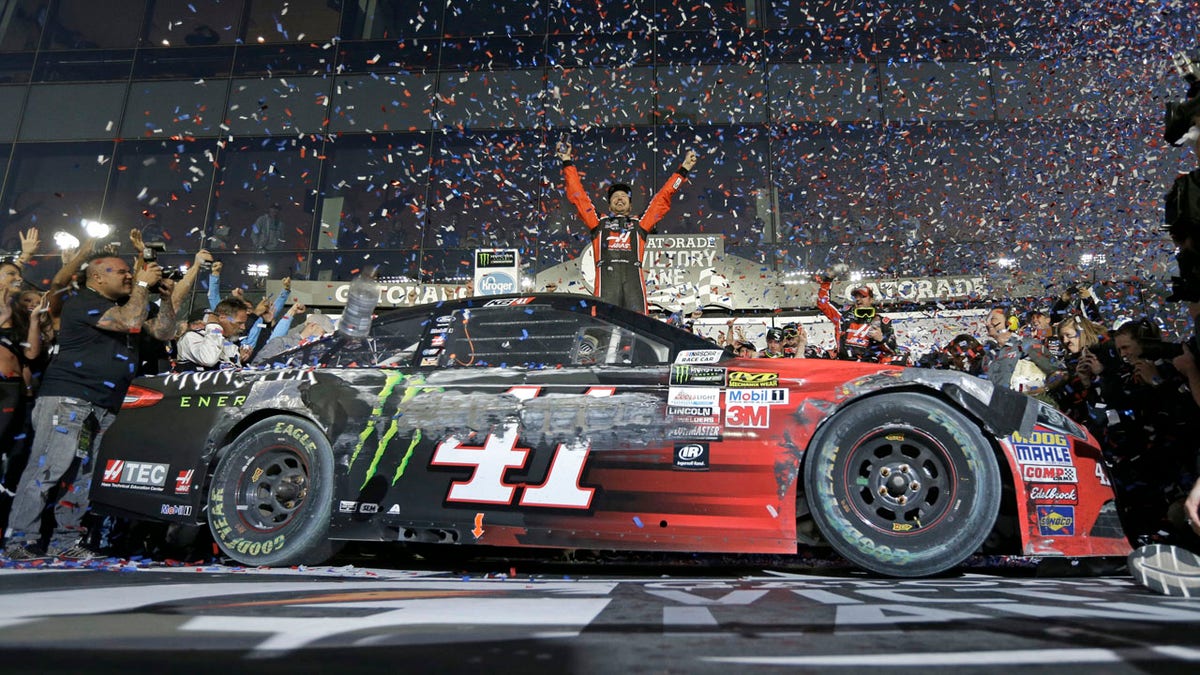
Feb. 26, 2017: Kurt Busch celebrates in Victory Lane after winning the Daytona 500. (AP Photo/Chuck Burton)
Kurt Busch won his first Daytona 500 at the age of 38 Sunday, passing Kyle Larson on the final lap. It was the only lap Busch led in the race.
Busch, who won what was then called the Nextel Cup as the series champion in 2004, took the checkered flag in the No. 41 Ford that was partly sponsored by Monster Energy, the new title sponsor for NASCAR.
Ryan Blaney finished second in a Ford. AJ Allmendinger was third in a Chevrolet, and Aric Almirola was fourth for Richard Petty Motorsports. Larson finished 12th after he ran out gas shortly after passing pole-sitter Chase Elliott, who also came up short on fuel and finished 14th.
Busch prevailed in a race that saw many of NASCAR's biggest stars knocked out in crashes. Seven-time and defending Cup series champion Jimmie Johnson, Dale Earnhardt Jr., Matt Kenseth, Kyle Busch, Danica Patrick, Jamie McMurray and Brad Keselowski were among those eliminated long before the checkered flag flew.
"The more that becomes unpredictable about Daytona, the more it becomes predictable to predict unpredictability," Busch said. "This car's completely thrashed. There's not a straight panel on it. The strategy today, who knew what to pit when, what segments were what. Everybody's wrecking as soon as we're done with the second segment.
"The more that I've run this race, the more that I just throw caution to the wind, let it rip and just elbows out. That's what we did."
It also was the first Daytona 500 win for Stewart-Haas Racing, which is co-owned by Tony Stewart. The three-time champion retired at the end of last season and watched his four cars race from the pits.
"I ran this damn race (17) years and couldn't win it, so finally won it as an owner," Stewart said.
The win was a huge boost for Ford, which lured Stewart-Haas Racing away from Chevrolet this season and celebrated the coup with its second Daytona 500 victory in three years. Joey Logano won in a Ford in 2015.
The first points race of the Monster era was run under a new format that split the 500 miles into three stages. Kyle Busch won the first stage, Kevin Harvick won the second stage and neither was a contender for the win. NASCAR also this year passed a rule that gave teams just five minutes to repair any damage on their cars or they were forced to retire.
But the race was slowed by wreck after wreck after wreck, including a 17-car accident at the start of the final stage that ended the race for seven-time and reigning series champion Johnson and Patrick. It was a particularly rough incident for Patrick and her Stewart-Haas Racing team, which had all four of its cars collected in the accident.
"Just seems like that could have been avoided and was uncalled for," Johnson said of the aggressive racing behind him that triggered the accident.
Patrick wasn't sure how bad her car was damaged, but knew it couldn't be fixed in the five minutes NASCAR now allots under a new rule this season. Also eliminated in the wreck was new SHR teammate Clint Bowyer.
"The five-minute clock is an interesting new element," she said. "I don't know if it is good or bad, but we don't want to go on track with stuff that isn't safe. It is a real shame. I feel like we could have been a contender at the end, for sure we could have been an influencer."
Kurt Busch was able to continue, but most of the top contenders found themselves on the outside looking in.
"Some years I think we have it where we run here and nobody wrecks and it's great racing," said Brad Keselowski, "and then you have other years like this where everybody wrecks all the time."
Roughly two hours before the race, NASCAR chairman Brian France issued drivers a stern warning about blocking.
France rarely wades into competition matters, especially in public, but stepped to the microphone to admonish the drivers. The Truck Series and Xfinity Series races were sloppy wreck-fests, and France hardly wanted the same spectacle for his Super Bowl.
"This is our biggest event," France told the packed drivers meeting. "What I don't normally do, and I'm going to do this today, is bring up a competition issue. This is for the drivers. And what I want you to think about. We realize blocking is part of racing. We understand that. We accept that.
"Do not look for NASCAR ... when you block somebody out there. It causes almost all the big incidents. Do not look for NASCAR ... you better hope there's a Good Samaritan behind you who is going to accept that block, because they have that lane and the right to it. And I don't often make those statements."
Blocking or not, the race was a mess of tangled sheet metal and wrecked cars.
The Associated Press contributed to this report.




















